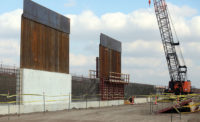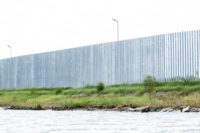President Donald Trump gained some ground in his fight to progress border wall building, with two favorable federal court rulings in early January—one that allows use of $3.6 billion in diverted military construction funds to pay for barrier work along the southern border, and the other that enables a halted privately financed wall project in Texas to resume.
The New Orleans appellate court on Jan. 8 allowed construction to continue on border wall contracts in California, New Mexico,Texas and Arizona, lifting a lower court’s halt to work that said Trump’s emergency declaration to use the milcon funds violated federal funding rules.
Trump said construction would begin immediately.
He also said he intends to divert an added $7.2 billion in DOD funding for this year, five times what Congress authorized in the 2020 budget, according to documents obtained by The Washington Post. This includes about $3.7 billion transferred from military construction, about $100 million more than in 2019, with the rest from anti-drug interdiction programs.
In response to the New Orleans ruling, plaintiff groups filed an emergency motion to the federal appeals court in San Francisco to stop the funding, arguing that the imminent construction of a massive, multibillion-dollar project “would radically alter delicate and unique lands across the border.”
They also claimed that a separate Supreme Court stay last year was irrelevant because it involved a different source of funding.
The plaintiffs have asked a district court judge in California to allow to go forward a December ruling that halted use of milcon funds to construct 175 miles of border wall and included a nationwide injunction. Judge Haywood Gilliam Jr. had put that ruling on hold, saying it could be reversed by the U.S. Supreme Court.
In the second case, a federal district court judge in Texas ruled Jan. 8 against the U.S. Justice Dept., which had asked the court to stop unauthorized land clearing and construction by contractor Fisher Industries on a 3.5-mile wall on private property funded privately along the Rio Grande without obtaining a permit from the International Boundary and Water Commission, as well as from the U.S. and Mexico, as required by treaty.
The judge said Justice’s argument was “highly speculative” and legally insufficient to prove the construction violated the treaty. He also ruled there was insufficient evidence that work would harm the nearby National Butterfly Center, which sued separately.
Meanwhile, the U.S. Defense Dept. Inspector General is probing Fisher’s win of its first federal border wall contract, for $400 million, awarded Dec. 2 in Arizona. The Government Accountability Office also has been asked to review the award.






Post a comment to this article
Report Abusive Comment